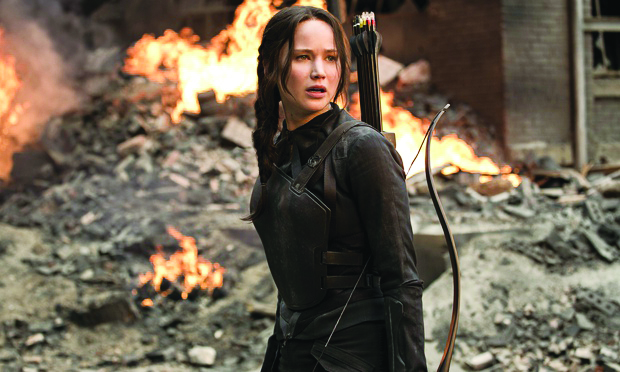Last updated on Jun 11, 2015
By Danielle Sposato
Staff Writer
What would you do if you knew that your name would be thrown into a Russian Roulette lottery system that would reveal your impend- ing fate? Can you picture yourself having to fight for your life — to kill innocents to survive? These odds are unimaginable, unthinkable, and unsettling; yet millions rave over these fictitious circumstances that are portrayed in the popular film franchise known as “The Hunger Games”.

“The Hunger Games,” along with many popular film franchises such as “Divergent,” “The Giver,” “The Host,” and “Maze Runner,” all have one common thread: their plots unravel in dystopian futures. In this day and age, the idea of a dystopia seems to intrigue many viewers, which is why these films have become so popular. “Mockingjay: Part 1” alone made $123 million in the box office for opening weekend according to Brent Lang’s Variety article, “Box Office: ‘Hunger Games: Mocking- jay: Part 1’ Scores Year’s Biggest Opening With $123 Million” on Nov. 23, 2014.
Why are viewers across the globe so enamored by these films? Perhaps the characters in these films drive their popularity because they are easy to identify with, according to Tina Schwartz, junior Early Childhood Education major. “I love Beatrice (“Divergent”); we both are soft-spoken but when the time comes, we face our fears and enter the unknown without hesitation,” Schwartz said.
Perhaps it is because the hero in these movies are in fact not male, they are female, which is why Julie Abbruzzese, a junior Public Relations major, loves “The Hunger Games.” “I like how it’s a girl that’s standing up to the government, not a man. She’s standing up for some- thing even though she doesn’t necessarily want to be the face of the re- bellion—she does it for the good of the nation. She’s an inspiration.”
Perhaps the reason many people find these films so relatable is because of the several characters that make the story, “The characters themselves are very relatable [in “The Hunger Games”]. Each one has different personality traits and feelings that people can identify with, whether it’s courage, anger, vengeance, or even fear. This reason alone is why I was so eager for the next movie to come out; I was able to feel what the characters were feeling” Schwartz said.
“Divergent” and “The Hunger Games,” along with several other films, revolve around individuals who have no control over their lives due to the lack of free will. One may argue that each of these movies have governments who control the fate of the public, which is what makes these films so enticing. “I think society loves movies about the world ending, or revolutions and dystopias because I think we are all fascinated with the idea of having such harsh and tyrannical governments,” Ab- bruzzese said. “I think we are sick individuals and we find [these films] interesting,” Abbruzzese added.
It is possible that some moviegoers are fascinated with living in a true dystopia; others, however, may not be. “I don’t find the idea of a dystopia appealing. The graphic nature of [“The Hunger Games”] is very depressing,” said Schwartz. That being said, the curiosity results in suc- cessful box office gains. “Divergent” grossed around $250 million world- wide according to Jefferson Grubbs’ Bustle article, “’Divergent’ Grosses $250 Million Worldwide, but How Does It Compare to Other YA Films?” on May 6, 2014.
Will this overwhelming trend of success last for dystopian fic- tions? It’s hard to tell; it’s even beginning to annoy the older generations. “Every time a movie comes out when the world ends, or there’s some sort of dystopian future, my dad always asks ‘who even wants to see this? Not me’,” Abbruzzese said. Is it because these films have a similar theme? Maybe living in a society that revolts against government will no longer appeal to audiences if it becomes a commonality in the theatres. As for now, we can still look forward to “Mockingjay: Part 2,” and the rest of the “Divergent” franchise to be released.




Be First to Comment